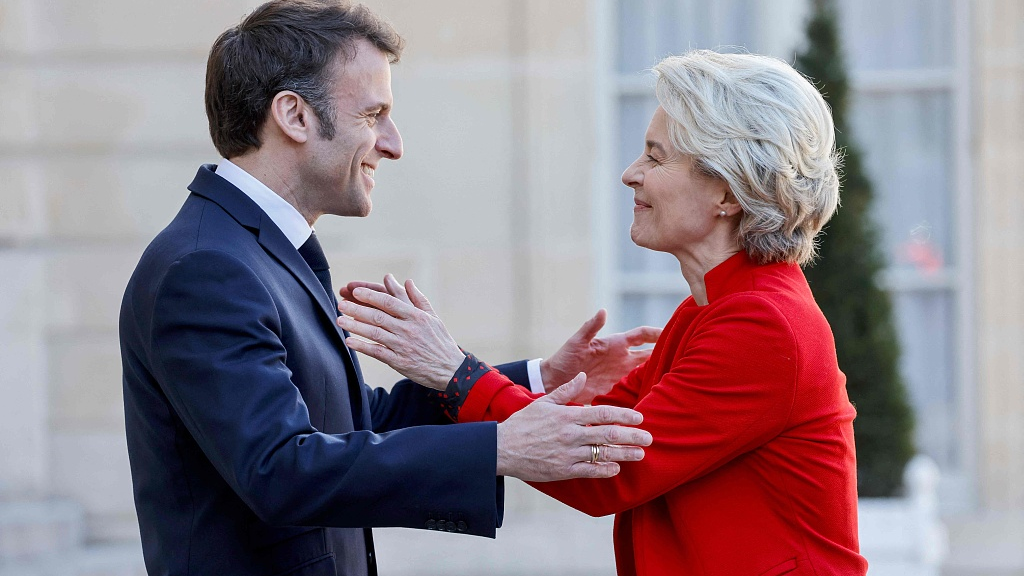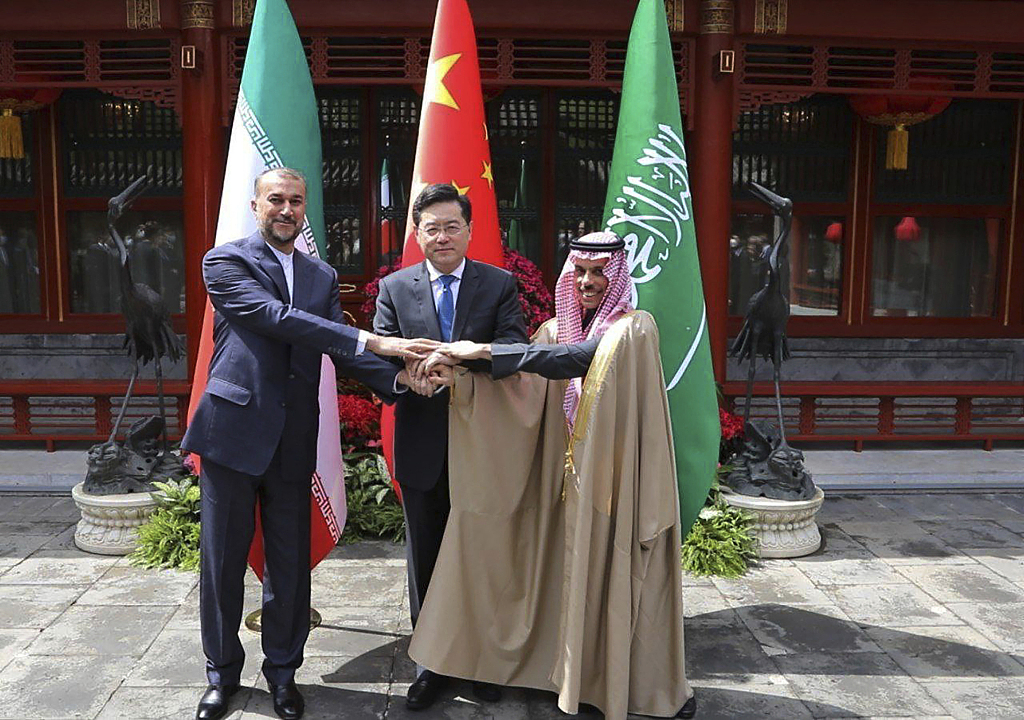
French President Emmanuel Macron (L) welcomes European Commission President Ursula von der Leyen prior to a meeting at the Elysee Palace in Paris, France, April 3, 2023. /CFP
French President Emmanuel Macron (L) welcomes European Commission President Ursula von der Leyen prior to a meeting at the Elysee Palace in Paris, France, April 3, 2023. /CFP
Editor's note: Imran Khalid is a freelance columnist on international affairs. The article reflects the author's opinions and not necessarily the views of CGTN.
China, owing to its economic metier and diplomatic credibility, is fast becoming a nucleus of economic and diplomatic activities in this emerging multipolar power fabric.
Particularly, European countries have been showing keen interest in building the economic and diplomatic engagements with China. The unabated string of high-profile visitors from Europe is a corroboration of the fact that a wind of change is taking shape in European thinking about China.
Last four months have witnessed an increasing number of European leaders who embarked upon their Beijing trips one after another. It started with German Chancellor Olaf Scholz and President of the European Council Charles Michel to China in December last year, which was followed by last week's appearance of Spanish Prime Minister Pedro Sanchez in the Boao Forum for Asia annual conference and then his two-day state visit that included a productive meeting with President Xi Jinping in Beijing.
And this week, French President Emmanuel Macron and European Commission President Ursula von der Leyen are visiting China. Furthermore, sources indicate that German Foreign Minister Annalena Baerbock is also considering a visit to China in mid-April.
The relationship between China and Europe is witnessing a promising revival, as demonstrated by a spate of recent high-level exchanges. This flurry of diplomatic activity will certainly serve as a catalyst for the rejuvenation of China-Europe relations and pave the way for a period of prosperous ties.
President Xi Jinping's three forward-looking initiatives – the Global Development Initiative, the Global Security Initiative and the Global Civilization Initiative – have deeply impacted the policy makers across the globe. These initiatives reflect China's innate desire to establish a community with a shared future for mankind through shared values and responsibilities.
The world, it seems, has started taking serious notice of such a powerful notion emanating from China. The momentous role played by China in the Iran-Saudi detente has drastically enhanced the credibility of China as a peace-loving country that seeks global peace and stability through dialogue and negotiations.

Iran's Foreign Minister Hossein Amirabdollahian (L) shakes hands with his Saudi Arabian counterpart Prince Faisal bin Farhan Al Saud (R) and his Chinese counterpart Qin Gang in Beijing, China, April 6, 2023. /CFP
Iran's Foreign Minister Hossein Amirabdollahian (L) shakes hands with his Saudi Arabian counterpart Prince Faisal bin Farhan Al Saud (R) and his Chinese counterpart Qin Gang in Beijing, China, April 6, 2023. /CFP
These days, European countries are quite wary of the protracted Russia-Ukraine conflict in their backyard and China is one of the few countries that have so far presented a comprehensive peace plan to resolve the conflict and other hotspots across the globe.
We can also witness a new thinking taking roots in Europe about peaceful resolution of this simmering conflict. There is a visible interest in Europe about China's position paper on the settlement of the conflict, which offers an effective blueprint to settle this issue through peaceful roadmap. That's why we have been observing more discussions on China's peace plan in the European think tanks and diplomatic circles.
In his meeting with President Xi, Spanish Prime Minister Sanchez discussed the 12-point position paper on the Russia-Ukraine conflict. In fact, before embarking upon his recent trip to China, Sanchez emphasized the importance of heeding China's perspective on resolving the Ukraine crisis.
Spain will take charge of the rotating presidency of the EU in the second half of this year, so his discussions with Xi on the Ukraine settlement are likely to influence the efforts towards a peaceful deal. Spain's position as holder of the six-month rotating presidency of the EU Council from July is especially significant, as the bloc grapples with a range of pressing issues including the Russia-Ukraine conflict, soaring inflation rates, and mounting pressure from the U.S. for a new Cold War.
As such, Spain's role in shaping the EU's response to these challenges will be important. Similarly, the recent speech by European Commission President von der Leyen on the future of China-Europe relations has captured the attention of observers across the spectrum. The current diplomatic engagements are widely viewed as a defining moment that will shape the trajectory of EU-China ties for years to come.
(If you want to contribute and have specific expertise, please contact us at opinions@cgtn.com. Follow @thouse_opinions on Twitter to discover the latest commentaries in the CGTN Opinion Section.)